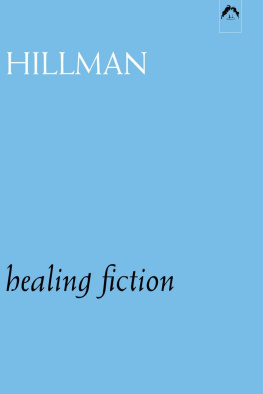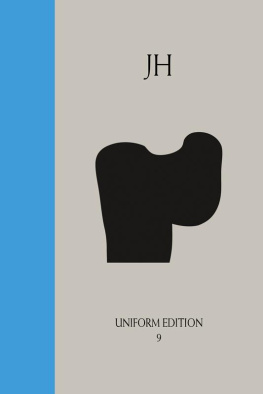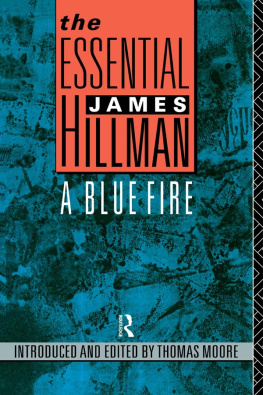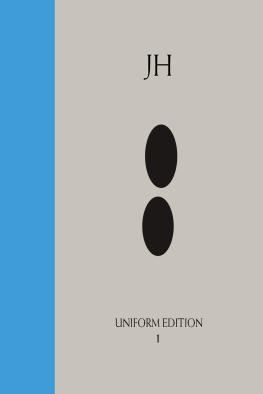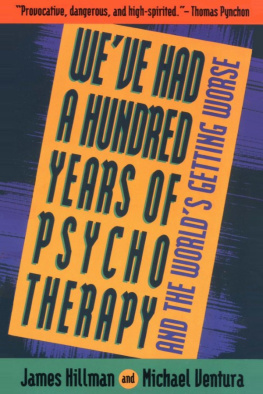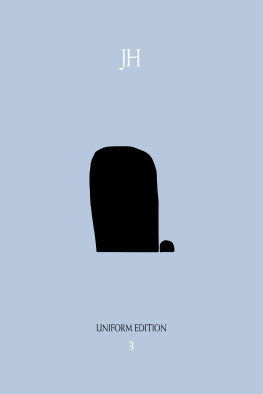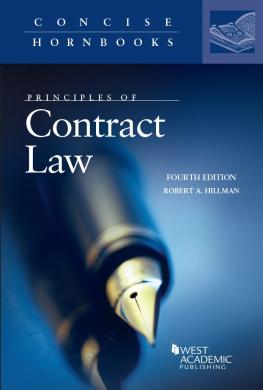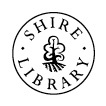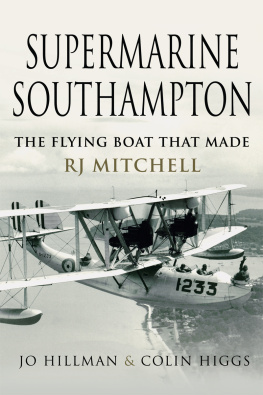Copyright 1983 by James Hillman
All rights reserved.
ISBN 978-0-88214-597-6 (Kindle Edition 2012, v. 2.0)
Published by Spring Publications, Inc.
Putnam, Conn.
www.springpublications.com
Originally published in 1983 by Station Hill Press, Barrytown, N.Y.
The Fiction of Case History: A Round was written at the request of James B. Wiggins and published in the book he edited, Religion as Story (New York: Harper & Row, Forum Book, 1975).
The Pandaemonium of Images: C.G. Jungs Contribution to Know Thyself was first presented at a conference at Notre Dame University (April 1975), organized by Thomas Kapacinskas, in honor of the centennial of Jungs birth; it was published in English in New Lugano Review III, 3/4 (1970): 3545, and in German translation by the late Philipp Wolff-Windegg in Eranos Yearbook 44 (1975), edited by Adolf Portmann and Rudolf Ritsema (Leiden: Brill, 1977).
Psychotherapys Inferiority Complex first appeared in Eranos Yearbook 46 (1977), edited by Adolf Portmann and Rudolf Ritsema (Frankfurt am Main: Insel Verlag, 1981).
All three essays have been revised and expanded for book publication. I am glad to thank James Wiggins, Thomas Kapacinskas, James Fitzsimmons, Philipp Wolff-Windegg, and Rudolf Ritsema for their help in different ways with the original versions of the chapters and Michele Martin for help with the final version.
JAMES HILLMAN
HEALING
FICTION

SPRING PUBLICATIONS, INC.
PUTNAM, CONNECTICUT
The Fiction of Case History:
A Round with Freud
The Fictional Freud
In 1934 the Italian pragmatist philosopher and writer Giovanni Papini published a curious interview with Freud. It is presented as a straight-on dialogue, as if Freud were privately confessing just what his work was all about. This is what Freud says:
Everybody thinks that I stand by the scientific character of my work and that my principal scope lies in curing mental maladies. This is a terrible error that has prevailed for years and that I have been unable to set right. I am a scientist by necessity, and not by vocation. I am really by nature an artist And of this there lies an irrefutable proof: which is that in all countries into which psychoanalysis has penetrated it has been better understood and applied by writers and artists than by doctors. My books, in fact, more resemble works of imagination than treatises on pathology I have been able to win my destiny in an indirect way, and have attained my dream: to remain a man of letters, though still in appearance a doctor. In all great men of science there is a leaven of fantasy, but no one proposes like me to translate the inspirations offered by the currents of modern literature into scientific theories. In psychoanalysis you may find fused together though changed into scientific jargon, the three greatest literary schools of the nineteenth century: Heine, Zola, and Mallarm are united in me under the patronage of my old master, Goethe.
The Freud in this interview reveals more of that master, and consequently of what psychotherapy is actually doing, than do the elaborations of Freudian theory. Psychoanalysis is a work of imaginative tellings in the realm of poiesis, which means simply making, and which I take to mean making by imagination into words. Our work more particularly belongs to the rhetoric of poiesis, by which I mean the persuasive power of imagining in words, an artfulness in speaking and hearing, writing and reading.
By placing depth psychology within a poetic and rhetorical cosmos, I am taking the consequences of a move I made in my 1972 Terry Lectures. There I essayed a psychology of soul that is also a psychology of the imagination, one which takes its point of departure neither in brain physiology, structural linguistics, nor analyses of behavior, but in the processes of the imagination. That is: a psychology that assumes a poetic basis of mind. Any case history of that mind will have to be an imaginative expression of this poetic basis, an imaginative making, a poetic fiction, disguised, as Papini says, in the language of medical science, both by the teller in his tale and the hearer in his recording.
In the prefatory remarks to his famous 1905 publication, Fragment of an Analysis of a Case of Hysteria the Dora story Freud writes: I am aware that in this town at least there are many physicians who choose to read a case history of this kind not as a contribution to the psychopathology of neuroses, but as a roman a clef designed for their private delectation. He also imagines unauthorized, nonmedical readers turning to this story.
Already the reader was figuring in Freuds, the writers, fantasy. And how often in his subsequent work we come upon these Victorian, these detective-story-style appeals to the reader, reminding him of what was said some pages back, or cautioning him that a point is worth holding in mind for it will appear again later, or showing concern for his wonder, confusion, perplexity and maybe even shock at the bold frankness with which a matter is being exposed.
Freuds association to the elaborate disguised secrecy he employs in publishing the Dora case is not to sexual psychopathology (Krafft-Ebing had not felt this sort of concern for the reader or the cases), not to household medical advisors (Tissot published his dreadful warnings on masturbation with plenty of cases), not to forensic psychiatry, or to medical Krankengeschichte with their illustrations of naked ladies and gentlemen standing full front and white, masked only with black rectangles over the eyes (as if they cant see us, so we cant see them).
No. Freuds associations are with literature, for which he uses-always a sign of affective importance a foreign term, roman clef, meaning a work which presents real persons and events, but disguised by the author. Now isnt this precisely what Freud did do, and so of course the nonmedical reader comes to his mind, because in his mind Freud was already associating himself with the writer of novels. The fantasy of the two kinds of readers-authorized and medical, unauthorized and literary refer to two figures in Freuds own fantasy.
Why did Freud get himself into this tangle between the medical and the literary when trying to write psychological case reports? Was he not struggling with a form of writing for which there were no existing models? His mind moved back and forth between the two great traditions, science and humanities, an oscillation that had to occur not merely because the medical was a cabalistic disguise for his literary vocation, finally recognized ironically by Papini, fraternally by Thomas Mann, and officially by his being awarded a Goethe prize for literature but more likely the dilemma had to occur because Freud was in process of inventing a genre, the very vehicle that was to carry his new vision into the world. His psychoanalysis could make no further headway in the world of medicine, unless it could find a suitable form of telling that gave the conviction, if not the substance, of medical empiricism. Freud tangled the two because he was engaged in both at once: fiction and case history; and ever since then in the history of our field, they are inseparable; our case histories are a way of writing fiction.
An analysis of Dora, the first major psychological case history the Iliad of our field draws our attention to its literary technique even while it presents itself as a medical technique. By technique I mean style as a deliberate procedure, craftsmanship; and I follow T.S. Eliots notion of technique which shows the writer as a cool scientist rather than as a disheveled madman. And is it not just this literary question of technique, cool or disheveled, which distanced Freud from Stekel and Reich and Gross, drawing him closer instead to Abraham and Jones?
Next page
